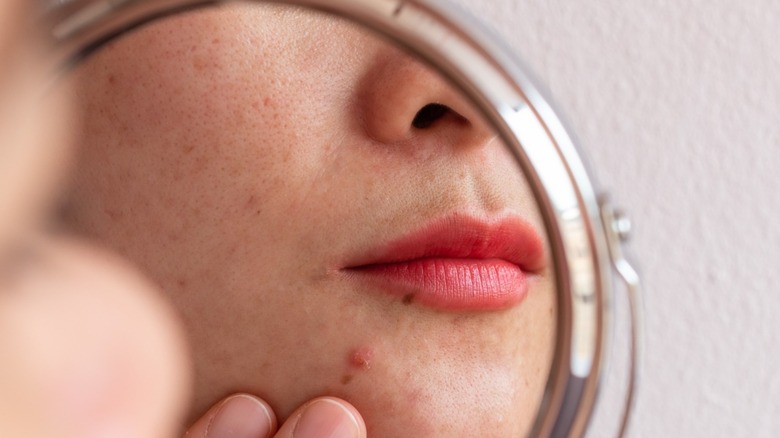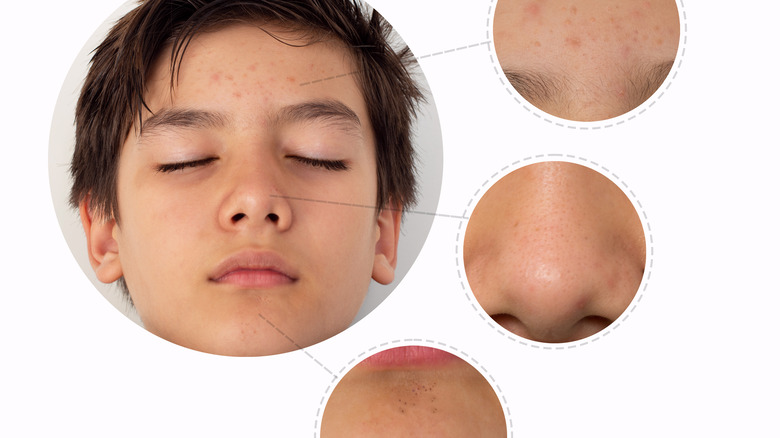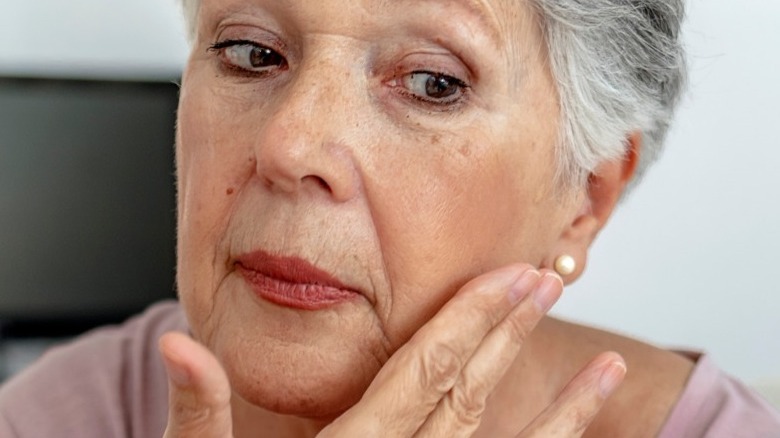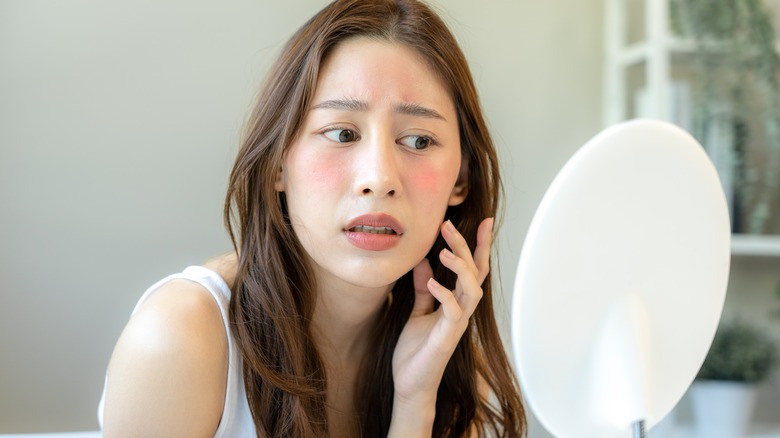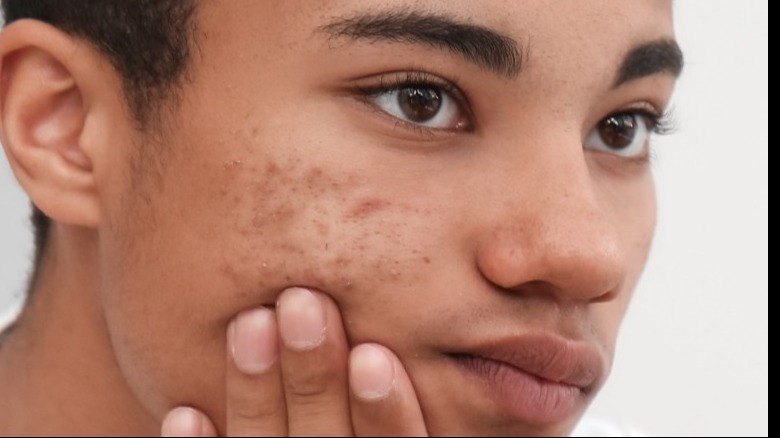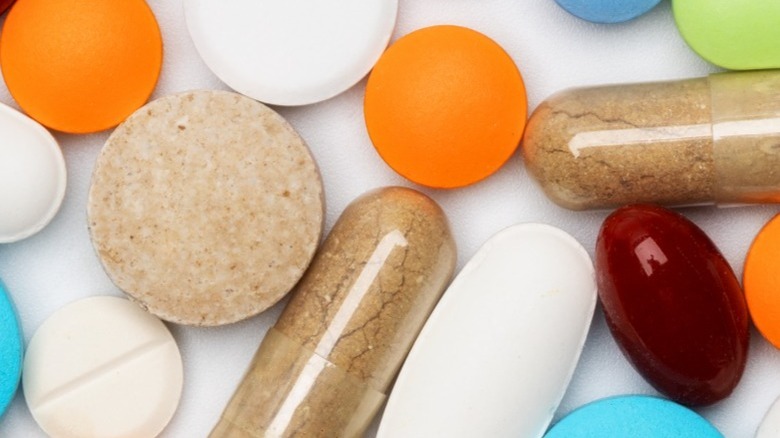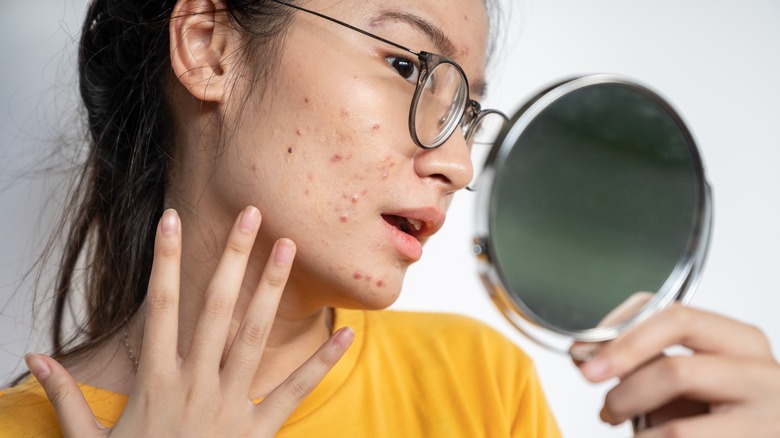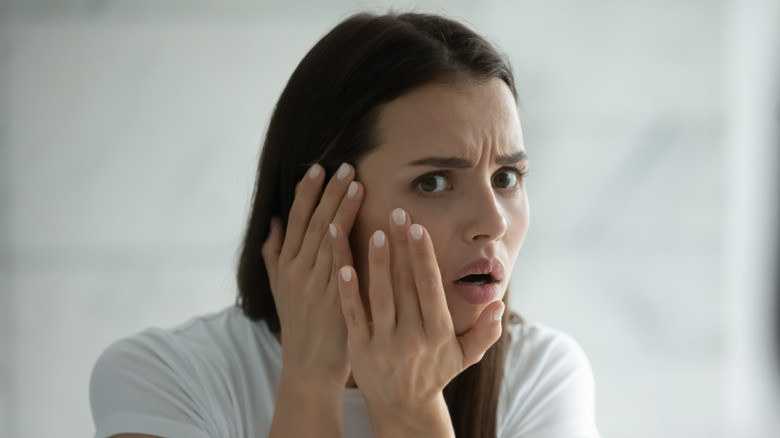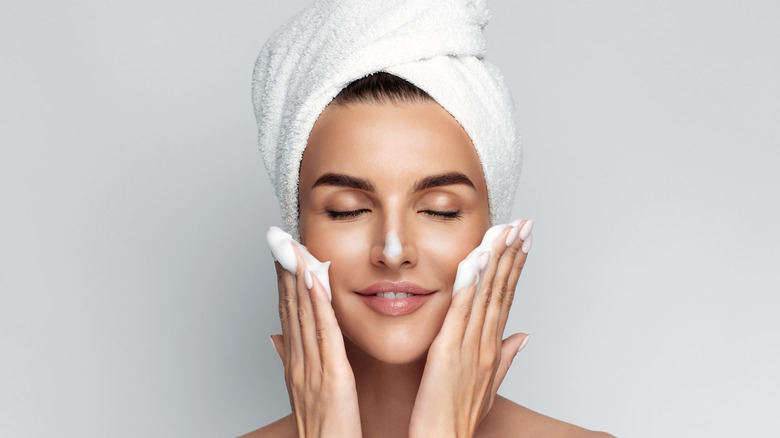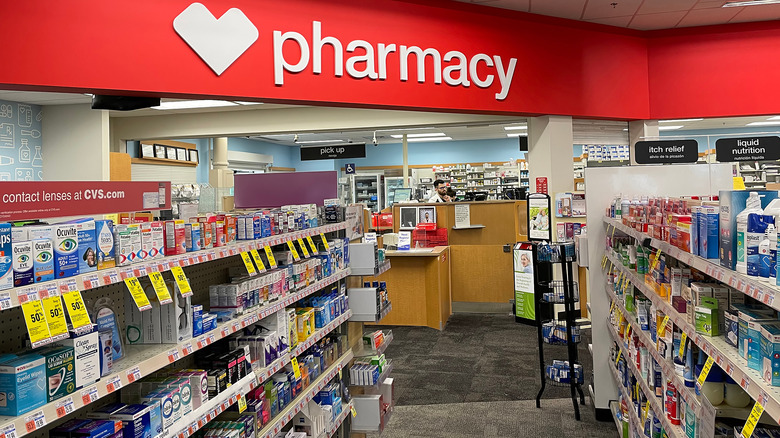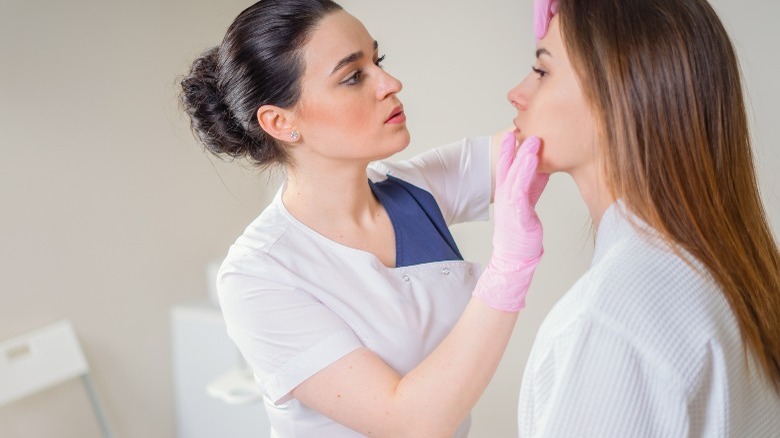Everything You Wanted To Know About Acne
Zits. Pimples. Blackheads. Call them what you like, those aggravating bumps you see in the mirror are commonly known as acne. Do you want to find out what to do about your acne? Are you wondering why you haven't outgrown acne, even though your teen years are long past? We have answers for you. It's not everyone's favorite cocktail conversation, but learning more about the condition — and ways to effectively treat it — can help you achieve clear skin and alleviate emotional distress.
According to the National Institute of Arthritis and Musculoskeletal and Skin Diseases, acne is an inflammatory skin disorder. It occurs when hair follicles in the skin become clogged, usually by a combination of body hair, oil, and skin cells the body is trying to shed. In turn, this enables the growth of bacteria, resulting in those irritating pimples on your skin. Several factors contribute to clogged pores, and acne can come in several different forms, with varying levels of severity. Here we'll review what you need to know about acne, and discuss what you can do to prevent and combat it.
Acne comes in many forms
Clogged hair follicles result in acne lesions, or comedones (via WebMD). But as you may have observed on your own skin, comedones come in several different types — and understanding the differences may help identify the specific kind that might be plaguing you and, in some cases, what the best treatment approaches will be.
Blackheads are open lesions with a black appearance. No, the color is not trapped dirt. Because the lesions are open, they are exposed to air. The skin cells inside the lesions become oxidized, which causes discoloration (via Healthline). In contrast, whiteheads are closed lesions. The appearance of white bumps is caused by the skin cells and oils that are creating a seal on the skin pore. Papules appear as little bumps, usually red or pink in color. Pustules look like whiteheads that are surrounded by red inflammation around the base, and the whitehead itself usually contains pus.
Nodules are larger and develop more deeply under the skin, and this kind of inflammation can feel hard and uncomfortable. Cysts may be mistaken for a boil. They are large and filled with pus. Both these types of acne are on the severe end of the spectrum, and due to their high risk of scarring should be treated by your medical team.
Acne is not limited to just teens
If you have acne, you're not alone. The American Academy of Dermatology (AAD) says that as many as 50 million Americans experience acne every year, adding that it is the number one skin condition in the U.S. Acne is most common among adolescents and young adults — about 85% of those aged 12-24 years deal with some form of acne. But it doesn't always end after these ages. As it turns out, the incidence of acne in grown-ups is actually on the rise, particularly in women. Researchers observed that acne affects more women than men in the 25+ age group (via Wolters Kluwer). In one study from the U.K., 75% of those referred for acne treatment were women. Other data from multiple countries showed that among women in their 20s, about 50% had acne. It's not uncommon for acne to persist into the 30s, 40s, and 50s. One study in JAMA Dermatology found that in middle age, 12% of women and 3% of men continue to experience clinical facial acne.
Why am I getting these cursed blemishes? It may be genetics
Genetics appear to play a role in an individual's likelihood of experiencing acne. According to the AAD, those who have close relatives who had acne, particularly both parents, are at higher risk of developing acne. Different studies of twins with acne provided evidence of a genetic link to acne. In an American study, the authors estimated that 50%-90% of twins with acne had likely inherited the condition. A U.K. study of 400 pairs of twins with acne found that 81% of cases were due to genetics.
Until recently, no specific genes had been identified as being associated with acne — but a study published in Nature Communications in 2018 found genetic variations that were more prevalent among subjects with severe acne. Continued research leads scientists to believe that variations among a large number of genes may indicate the likelihood that an individual will develop acne (via Dermatology Times). These findings lead to optimism that more specific and individualized acne treatments can be developed.
Does my diet affect acne?
Conventional wisdom has long held that certain foods cause acne, with people often pointing to sugary and fatty foods as key offenders (via WebMD). But as pointed out in a Dermatoendocrinology article, medical research had historically found no conclusive evidence that diet was directly linked to acne breakouts.
However, recent research is shedding new light on the possible connections between food and acne. In a study published in JAMA Dermatology in 2020, researchers compared the diets and the incidence of acne in over 24,000 adult participants and found that high-sugar foods and beverages, as well as foods high in fat — including dairy and meat — were associated with acne. While the study's authors suggested the need for further research to corroborate their findings, it might be a good idea to avoid foods and beverages high in sugar and fat, as doing so may help stop acne eruptions.
Raging hormones
Hormones are the primary reason that teens have acne, and that women experience more acne than men during adulthood (via Verywell Health). Androgen hormones, or sex hormones, are produced by adrenal glands, ovaries, and testicles. They play an important role in puberty and in the continued reproductive capacities of both men and women (i.e. in the creation of sperm and in regulating the menstrual cycle) among other roles, according to the Cleveland Clinic. They are also key players in acne vulgaris (via Verywell Health). This is because androgens cause the skin glands to release oil, or sebum, that is meant to provide lubrication that helps guard skin against moisture and possible damage. But when sebum production gets out of hand during times that hormones are raging — during puberty, or for women during their periods, pregnancy, or perimenopause — the excess oil combines with dead skin cells, which contributes to the clogging of hair follicles and skin pores, eventually leading to breakouts.
Some medications affect acne
Some medications can cause or worsen acne. Acne that is caused by medication is called drug-induced acne (via Clinics in Dermatology). In these cases, the resulting blemishes are a direct response to the drug. Medications that cause drug-induced acne include Lithium (prescribed for bipolar disorder and depression), some types of steroids, certain drugs used in cancer treatment, and sedatives and cough medicines containing bromides or iodides (via WebMD).
Some drugs also cause what Dr. Lisa A. Garner, a clinical professor of dermatology, calls "acneiform" drug eruptions, which aren't exactly acne but do appear as similar blemishes, often on the chest and/or back (via WebMD). But whichever kind of breakout it is, most people aren't going to feel any better about the distinction; they just want to get rid of the blemishes.
In both cases, stopping the medication generally stops the breakouts — but of course, it is not always safe to suddenly stop taking medicines. If you suspect your blemishes are the result of medications, the first thing to do is to talk to your doctor. He or she may change your dosage, recommend an alternative drug, or suggest acne treatment.
Are you stressed out?
Could stress be contributing to your acne? One way to gain some insight is to consider where the acne is occurring. As Dr. Sonia Vaidian, the Clinical Quality and Process Improvement Manager at ModernMD Urgent Care, told Byrdie, stress-related acne typically breaks out in the "T-zone": your forehead, nose, and chin.
While researchers are unclear whether stress directly causes acne, it seems that it does make the condition worse. For example, one study found that students experienced more acne during final exams, a time of typically heightened stress (via Archives of Dermatology). Some researchers have noted that stress can stimulate hormone production that can worsen acne (via Time). But we also know that acne causes stress (via Healthline). So figuring out the cause and effect of stress and acne can be a bit like solving the chicken-and-the-egg riddle. Regardless of which came first, stress does seem to play a role in producing acne and making the condition worse. Finding ways to reduce stress can help. For instance, be sure to keep up with your exercise routine, get enough sleep, and try some stress-busting techniques like deep breathing exercises (via Insider).
Environmental and other factors that contribute to acne
A number of other factors can contribute to acne breakouts. Some, unfortunately, you can't control, including the air quality and climate where you live. For instance, some research found a possible association between air quality and acne, noting that a rise in certain pollutants corresponded with an increase in breakouts. Climate and seasonal weather changes can impact acne, as well, according to recent research published in the Journal of Cosmetic Dermatology. Warm, humid weather causes the skin to produce more oil, which can lead to acne flares.
On the other hand, certain factors that might lead to acne are within your control. Your makeup or products might be culprits: Oily, greasy beauty products can clog follicles and promote acne (via Well + Good), and using too much makeup, or wearing it for too long, can also cause pimples (via NBC News). Dermatologists even have a name for the condition: acne cosmetica. For this reason, you may want to look for the term "non-comedogenic" on your makeup and product labels — this indicates the product is less likely to clog pores.
And if you need another reason to consider kicking the smoking habit, researchers found a correlation between cigarette smoking and acne. In a study of women ages 25–50, they observed higher levels of sebum and acne in smokers than in nonsmokers. In the subjects who were smokers, they also found lower amounts of vitamin E, an antioxidant that helps protect and moisturize the skin.
Physical side effects of acne
Besides causing unwanted spots, acne may also cause sensitivity and pain (via Medscape). The degree of pain depends on how much the pimple or area is inflamed, the size of the blemish, and the pimple's depth in the skin. Mild acne consisting of whiteheads and blackheads may be sensitive to the touch, but not necessarily painful. Nodules and cysts, on the other hand, are larger, have much more inflammation, and are deeper under the skin. For these reasons, they tend to be more painful.
Itching is also common to those experiencing acne, though typically this side effect is secondary to and not directly caused by acne (via Healthline). Over-washing can dry the skin out and lead to itching. Some acne treatments may also dry the skin and lead to itching for some people.
Scars are perhaps the most undesirable acne side effect. Scars develop as the result of the inflammation that causes the blemish itself and damages the walls of the pore below the skin's surface (via Cleveland Clinic). Many of these pits are small and quickly repaired by the skin. Others are deeper and will leave an indented scar after the wound heals. In other cases, the skin's repair mechanism goes a bit overboard, causing bumps. Not everyone develops scars — according to the Cleveland Clinic, about 20% of people with acne experience acne scarring. Happily, as they point out, much scarring responds well to treatment.
Emotional effects of acne
Acne is not physically threatening, but it does bring a lot of emotional baggage. According to the AAD, the emotional impact of acne has been well documented in multiple studies. Among adolescents, breakouts can cause both boys and girls to experience low self-esteem, a lack of confidence, and feelings of anger and isolation. In turn, such feelings of low self-worth have an impact on teens' social lives, causing some to avoid healthy activities like clubs or athletics. Those with acne may be subject to bullying, which creates even more emotional pain. Loneliness, anger, and shame often lead to depression. Teens with acne have a higher incidence of suicidal ideation than their peers (via Journal of Investigative Dermatology). But adolescents aren't alone in their experience of negative emotions. Adults with acne report similar feelings of anxiety and depression (via GoodRx Health).
Unfortunately, the fact that acne carries with it a stigma in society doesn't help the situation (via Science Daily). However, medical professionals are increasingly recognizing that, just like physical acne scars, the emotional scars of acne also require treatment.
If you or someone you know is struggling with mental health or having suicidal thoughts, please contact the Crisis Text Line by texting HOME to 741741, call the National Alliance on Mental Illness helpline at 1-800-950-NAMI (6264), visit the National Institute of Mental Health website, or call the National Suicide Prevention Lifeline at 1-800-273-TALK (8255).
Non-prescription treatment for acne
There is good news: Acne can be treated, and many treatments are effective. Treatment for acne starts with daily hygiene. Wash your face twice a day with soap and water. Don't over-wash; you may make the acne worse or dry out your skin.
Over-the-counter (OTC) products are typically used for milder forms of acne. Topical treatments applied directly to the skin are available as creams, washes, lotions, or gels. Common ingredients for combatting acne include benzoyl peroxide, salicylic acid, azelaic acid, and sulfur. Benzoyl peroxide attacks bacteria in the skin that contributes to acne (via GoodRx). One downside to this ingredient is that it bleaches fabric, so be careful when using it. Salicylic acid works by helping to unclog pores by removing oil and dead skin (via Good Housekeeping). Azelaic acid reduces inflammation, kills bacteria, and may also reduce minor scarring (via MedlinePlus). Sulfur reduces bacteria and removes oil and dead skin from the pores (via Derm Collective).
Use (and overuse) of these products may result in some minor irritation such as skin dryness, peeling, redness, or a temporary burning sensation (via U.S. Pharmacist). If you experience these symptoms, consult a dermatologist to see which product might be best for you.
Prescriptions and procedures to treat acne
Prescription treatments for acne include oral and topical antibiotics that treat bacteria and inflammation (via Mayo Clinic). Retinoids help keep pores from becoming clogged, and are used for moderate-to-severe cases of acne. Birth control pills are prescribed to women as a way to arrest the effects that their hormones have on acne. Anti-androgen agents block hormonal effects on sebum glands, reducing oil production. Isotretinoin may be prescribed in cases that have not responded to other therapies.
Other treatments a dermatologist might recommend when acne is not responding to medication include procedures such as extraction, incision and drainage, and steroid injections (via AAD). During extraction, sterilized tools remove blackheads and whiteheads. Deep cysts and nodules may require a steroid injection, or they may need to be cut open and cleaned out.
Scar-removing techniques employed by dermatologists include chemical peeling to remove a layer of skin, injections and fillers to fill indentations, and laser therapy and dermabrasion to remove raised scars (via APDerm).
When to see a doctor about your acne
Doctors evaluate the severity of acne based on the type and number of pimples (via the National Health Service). Those criteria determine if the acne is mild, moderate, or severe. Mild acne and some moderate acne can generally be treated effectively with products available at your local drug store. Severe acne, characterized by many inflamed lesions, warrants the attention of a doctor right away.
If you've been treating acne with over-the-counter products but aren't seeing desired results, it's time to see your doctor or a dermatologist (per WebMD). If you haven't seen an improvement over the course of six weeks, schedule an appointment. Other reasons include noticeable scarring, which indicates that you have a more severe type of acne that requires professional treatment.
And don't forget the psychological impact of acne. If you're feeling down and aren't comfortable being around people in social settings, it's a good idea to see your doctor about your acne, and also consider some counseling with a therapist.

